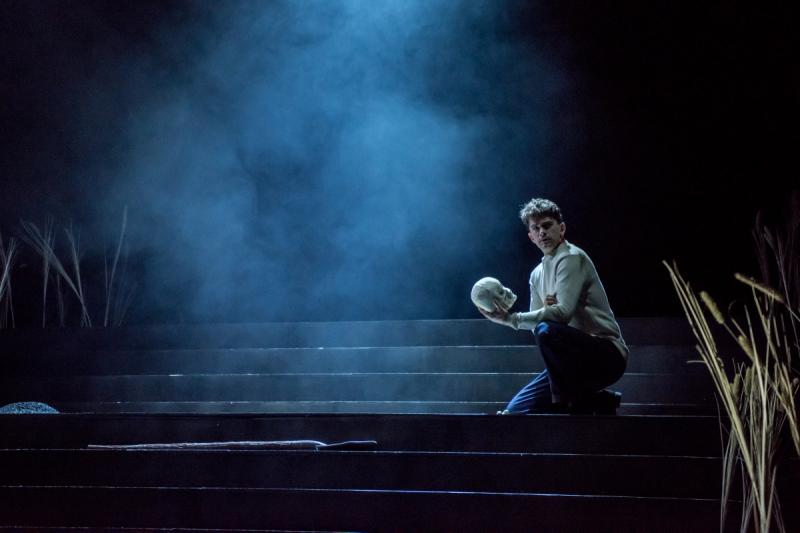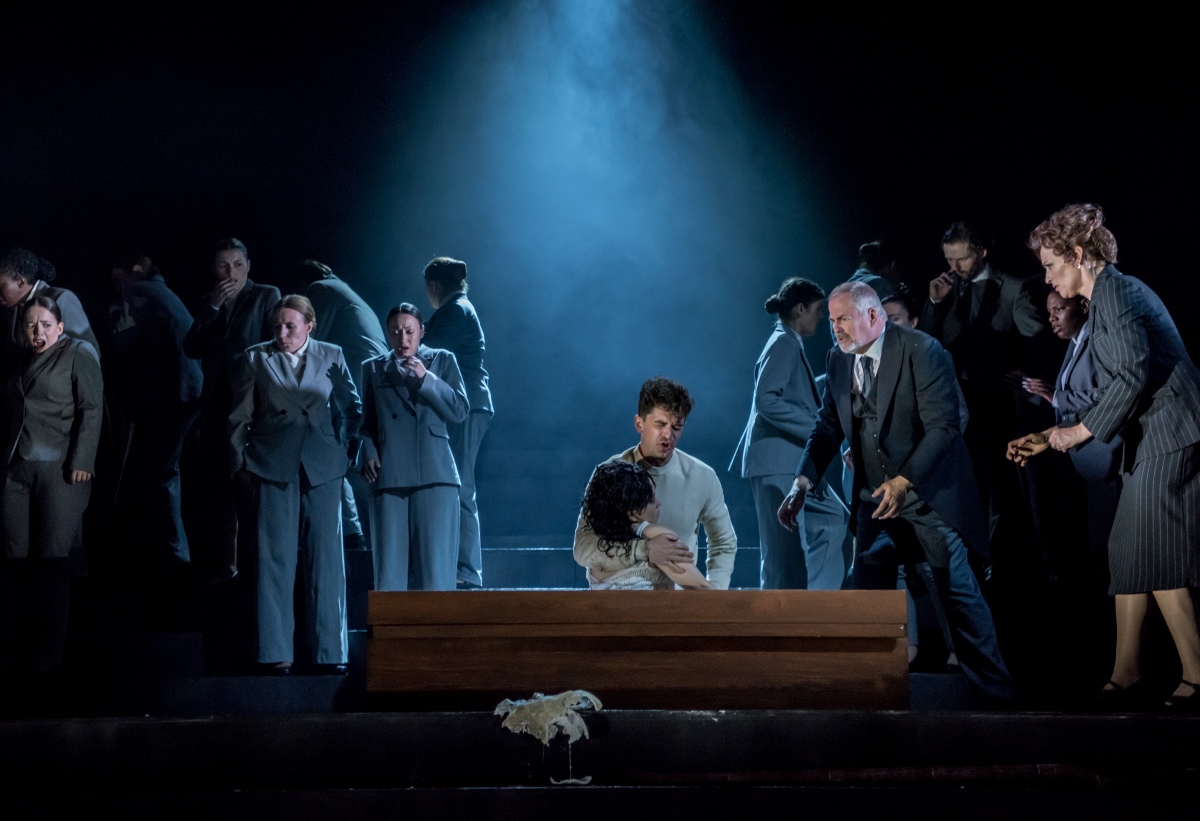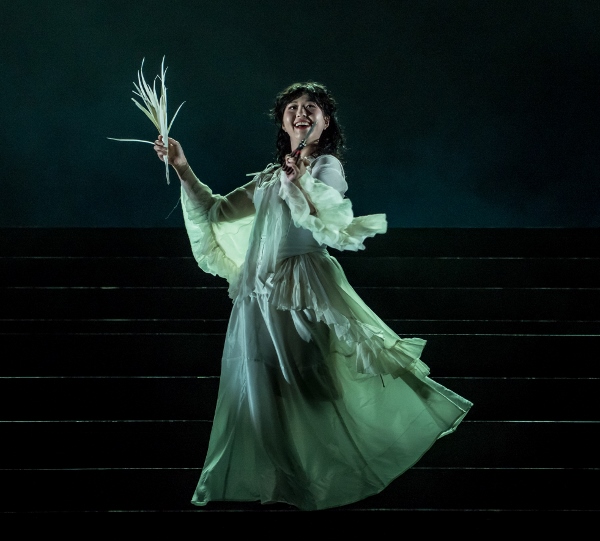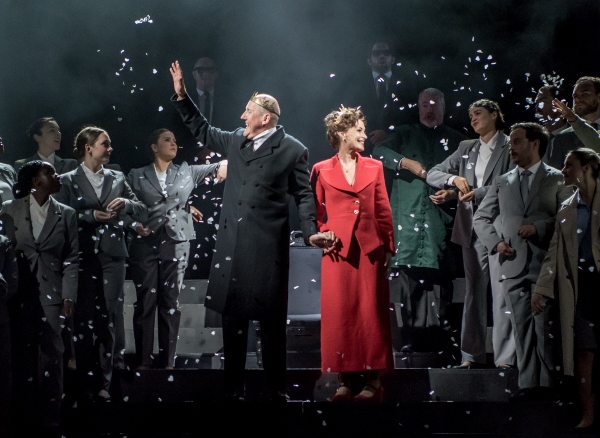Hamlet, Buxton International Festival review - how to re-imagine re-imagined Shakespeare | reviews, news & interviews
Hamlet, Buxton International Festival review - how to re-imagine re-imagined Shakespeare
Hamlet, Buxton International Festival review - how to re-imagine re-imagined Shakespeare
Music comes first in very 19th century, very Romantic, very French operatic creation

Ambroise Thomas’s version of Hamlet is the flagship production of this year’s Buxton International Festival and was always going to be a considerable challenge. How to re-imagine what is admittedly a very 19th century, very French Romantic re-imagining of Shakespeare for the intimate setting of Buxton Opera House and the necessarily limited resources of a summer festival?
Adrian Kelly, the festival’s artistic director and conductor of the opera, with his director Jack Furness, have made some clear and rewarding decisions. The music comes first: the score is renowned for its resourceful and often entrancingly beautiful scoring, and they have the Orchestra of Opera North in the pit (albeit with just 20 strings in total, but they make a robust sound). There are four major roles (Claudius, Gertrude, Hamlet and Ophélie) but also some important lesser ones, and the casting is well chosen – and committed to exciting young voices in the case of the two last-named – with at least one notable performer among those surrounding the central four. The chorus, 20-strong, is powerful enough to fill the acoustic space and has been excellently trained (Freddie Brown).
The predominant feature of the staging, in Sami Fendall’s concept, is greyness and gloom, the better to stand as foil for the colour in the music, and effects are often conjured through highly effective use of light (Jake Wiltshire). The main feature of the set is a rising series of steps, providing three different levels on which the action can be played.
Whatever reservations might be felt about the impact of the piece as a whole are down to the shape given to it by Thomas and his librettists Carré and Barbier (who, in 1868, had already written Thomas’s Mignon, Gounod’s Faust and Roméo et Juliette, and were to go on to write Offenbach’s grand opera, Les Contes d’Hoffmann). British critics have often derided the free hand with which they re-cast Shakespeare, including the happy ending, but when it’s seen on stage the regrets are more to do with its tableaux-style series of big, static scenes and imposition of crowd-pleasing operatic pot-boilers such as the “mad scene” for Ophélie, and two drinking songs. But similar things have been done to Shakespeare in opera by others, and the best approach is to make the most of the music, which is exactly what’s been done here.  The production begins with a funeral scene, the burial of Hamlet’s father – the grave diggers are to return at the end, of course – as Thomas’s music strikes a menacing note, and the coronation of Claudius is marked by the brass ensemble sounding from the upper gallery of the theatre. We’re in an indeterminate time, with generically modern costumes, and political parallels are indicated by the presence of shaded heavies on the look-out to crush dissent against what is clearly now a repressive regime (masked gunmen appear later, and periodically, as scenes succeed each other, we see helpless individuals hooded and frog-marched away, to rub the point in).
The production begins with a funeral scene, the burial of Hamlet’s father – the grave diggers are to return at the end, of course – as Thomas’s music strikes a menacing note, and the coronation of Claudius is marked by the brass ensemble sounding from the upper gallery of the theatre. We’re in an indeterminate time, with generically modern costumes, and political parallels are indicated by the presence of shaded heavies on the look-out to crush dissent against what is clearly now a repressive regime (masked gunmen appear later, and periodically, as scenes succeed each other, we see helpless individuals hooded and frog-marched away, to rub the point in).
Hamlet and Ophélie are lovers – there’s a spot of pawing and horizontal embracing, which for me never works in the theatre: you can evoke the thought of more by showing less – but at least that’s clear at the outset. Clouds and mist make a suitable setting for the Ghost’s appearance and its call of “Souviens-toi!”.
We see Ophélie as a poetry-loving young maiden against a kind of slo-mo wedding party provided by the chorus, while Gertrude (Allison Cook) is revealed as the evil genius behind Claudius, while the Players relish their time in the spotlight: their dumb-show is portrayed by silhouette-like figures moving very slowly against a white screen, while Hamlet’s feigned madness follows his drinking song and lends a lighter touch before the tempo’s whipped up to make the climactic Act 2 finale.
Act 3 takes us to “Être ou pas être – O mystère!” (the translations of Shakespeare’s most famous lines strike as near-doggerel at times), but Hamlet’s soliloquizing is matched by an equally weighty solo for Claudius, while Hamlet, learning that Polonius was involved in the murder of his father, determines to reject Ophélie despite Gertrude’s urging, and Thomas gives us a trio for the three, exploring their respective emotions in rather conventional operatic terms.
 Ophélie’s mad scene presents a new location, as tufts of leaves appear around the set and there’s clearly a spot of water somewhere at the rear. The final scene brings back the grave diggers as a brief comic turn and then Hamlet’s soliloquy before a fight with Laërte, all grunts and thumps, but from which both men recover remarkably well, and the chorus sing sentimentally for Ophélie’s funeral, before the Ghost appears again to prevent Hamlet killing himself but commanding him to kill Claudius and Polonius, which he duly does before accepting his future as king. (Thomas and his writers did provide an alternative ending, with Hamlet dying, too, pour les Anglais, but this is their original).
Ophélie’s mad scene presents a new location, as tufts of leaves appear around the set and there’s clearly a spot of water somewhere at the rear. The final scene brings back the grave diggers as a brief comic turn and then Hamlet’s soliloquy before a fight with Laërte, all grunts and thumps, but from which both men recover remarkably well, and the chorus sing sentimentally for Ophélie’s funeral, before the Ghost appears again to prevent Hamlet killing himself but commanding him to kill Claudius and Polonius, which he duly does before accepting his future as king. (Thomas and his writers did provide an alternative ending, with Hamlet dying, too, pour les Anglais, but this is their original).
Buxton has history with Hamlet: it was done in 1980, in the early years of the festival, when a young Thomas Allen made a considerable impact in the title role. In this production the same is true of Gregory Feldmann, a gifted young baritone with a voice that sustains its power throughout and impressive acting strengths, seen from the first appearance of the Ghost (Spectre infernal ...) and later in his feigned madness after the drinking song and his despair and regret in the graveyard.
Yewon Han (pictured above) is outstanding as Ophélie: the mad scene is a classic for a dramatic soprano and she raps it out with technical virtuosity and all-out emotion: her earlier high spots are more to do with expressing tenderness and innocence, which she embodies with an appealingly gentler, warm tone.  Gertrude is Allison Cook, a real soprano falcon in the 19th century French style, with both pure high and incisive low registers, the ability to handle wide leaps from one to the other, and a great sense of the dramatic: she comes into her own in her scene with Ophélie at the wedding celebration and after Hamlet’s rejection of her.
Gertrude is Allison Cook, a real soprano falcon in the 19th century French style, with both pure high and incisive low registers, the ability to handle wide leaps from one to the other, and a great sense of the dramatic: she comes into her own in her scene with Ophélie at the wedding celebration and after Hamlet’s rejection of her.
And Alastair Miles (an old friend of the festival) is every bit as impressive as Claudius, immediately believable as wily political operator and suspicious ruler, while outstanding in the long solo in Act Three. He even got a bit of pantomime-style booing at the certain calls (among the cheers) – a bit tough considering Gertrude is as much a baddie as he is! (See picture above of him with Allison Cook and members of the chorus).
Mentioned, too, should be Dan D’Souza (Horatio), with a fine baritone voice which Buxton has done well to land in a relatively minor role, and Joshua Baxter, a mellow and very listenable lyric tenor, as Laërte.
Adrian Kelly’s role at the Zurich Opera seems to have proved a highly useful connection in the casting of Gregory Feldmann, Yewon Han and Allison Cook for this production – a link which the BIF should rightly be grateful for: it bodes well for the future.
rating
Explore topics
Share this article
The future of Arts Journalism
You can stop theartsdesk.com closing!
We urgently need financing to survive. Our fundraising drive has thus far raised £49,000 but we need to reach £100,000 or we will be forced to close. Please contribute here: https://gofund.me/c3f6033d
And if you can forward this information to anyone who might assist, we’d be grateful.

Subscribe to theartsdesk.com
Thank you for continuing to read our work on theartsdesk.com. For unlimited access to every article in its entirety, including our archive of more than 15,000 pieces, we're asking for £5 per month or £40 per year. We feel it's a very good deal, and hope you do too.
To take a subscription now simply click here.
And if you're looking for that extra gift for a friend or family member, why not treat them to a theartsdesk.com gift subscription?
more Opera
 Orpheus and Eurydice, Opera Queensland/SCO, Edinburgh International Festival 2025 review - dazzling, but distracting
Eye-popping acrobatics don’t always assist in Gluck’s quest for operatic truth
Orpheus and Eurydice, Opera Queensland/SCO, Edinburgh International Festival 2025 review - dazzling, but distracting
Eye-popping acrobatics don’t always assist in Gluck’s quest for operatic truth
 MARS, Irish National Opera review - silly space oddity with fun stretches
Cast, orchestra and production give Jennifer Walshe’s bold collage their all
MARS, Irish National Opera review - silly space oddity with fun stretches
Cast, orchestra and production give Jennifer Walshe’s bold collage their all
 Káťa Kabanová, Glyndebourne review - emotional concentration in a salle modulable
Janáček superbly done through or in spite of the symbolism
Káťa Kabanová, Glyndebourne review - emotional concentration in a salle modulable
Janáček superbly done through or in spite of the symbolism
 Buxton International Festival 2025 review - a lavish offering of smaller-scale work
Allison Cook stands out in a fascinating integrated double bill of Bernstein and Poulenc
Buxton International Festival 2025 review - a lavish offering of smaller-scale work
Allison Cook stands out in a fascinating integrated double bill of Bernstein and Poulenc
 Tosca, Clonter Opera review - beauty and integrity in miniature
Happy surprises and a convincing interpretation of Puccini for today
Tosca, Clonter Opera review - beauty and integrity in miniature
Happy surprises and a convincing interpretation of Puccini for today
 Hamlet, Buxton International Festival review - how to re-imagine re-imagined Shakespeare
Music comes first in very 19th century, very Romantic, very French operatic creation
Hamlet, Buxton International Festival review - how to re-imagine re-imagined Shakespeare
Music comes first in very 19th century, very Romantic, very French operatic creation
 Falstaff, Glyndebourne review - knockabout and nostalgia in postwar Windsor
A fat knight to remember, and snappy stagecraft, overcome some tedious waits
Falstaff, Glyndebourne review - knockabout and nostalgia in postwar Windsor
A fat knight to remember, and snappy stagecraft, overcome some tedious waits
 Salome, LSO, Pappano, Barbican review - a partnership in a million
Asmik Grigorian is vocal perfection in league with a great conductor and orchestra
Salome, LSO, Pappano, Barbican review - a partnership in a million
Asmik Grigorian is vocal perfection in league with a great conductor and orchestra
 Semele, Royal Opera review - unholy smoke
Style comes and goes in a justifiably dark treatment of Handelian myth
Semele, Royal Opera review - unholy smoke
Style comes and goes in a justifiably dark treatment of Handelian myth
 Le nozze di Figaro, Glyndebourne review - perceptive humanity in period setting
Mostly glorious cast, sharp ideas, fussy conducting
Le nozze di Figaro, Glyndebourne review - perceptive humanity in period setting
Mostly glorious cast, sharp ideas, fussy conducting
 Fidelio, Garsington Opera review - a battle of sunshine and shadows
Intimacy yields to spectacle as Beethoven's light of freedom triumphs
Fidelio, Garsington Opera review - a battle of sunshine and shadows
Intimacy yields to spectacle as Beethoven's light of freedom triumphs
 Dangerous Matter, RNCM, Manchester review - opera meets science in an 18th century tale
Big doses of history and didaction are injected into 50 minutes of music theatre
Dangerous Matter, RNCM, Manchester review - opera meets science in an 18th century tale
Big doses of history and didaction are injected into 50 minutes of music theatre

Add comment